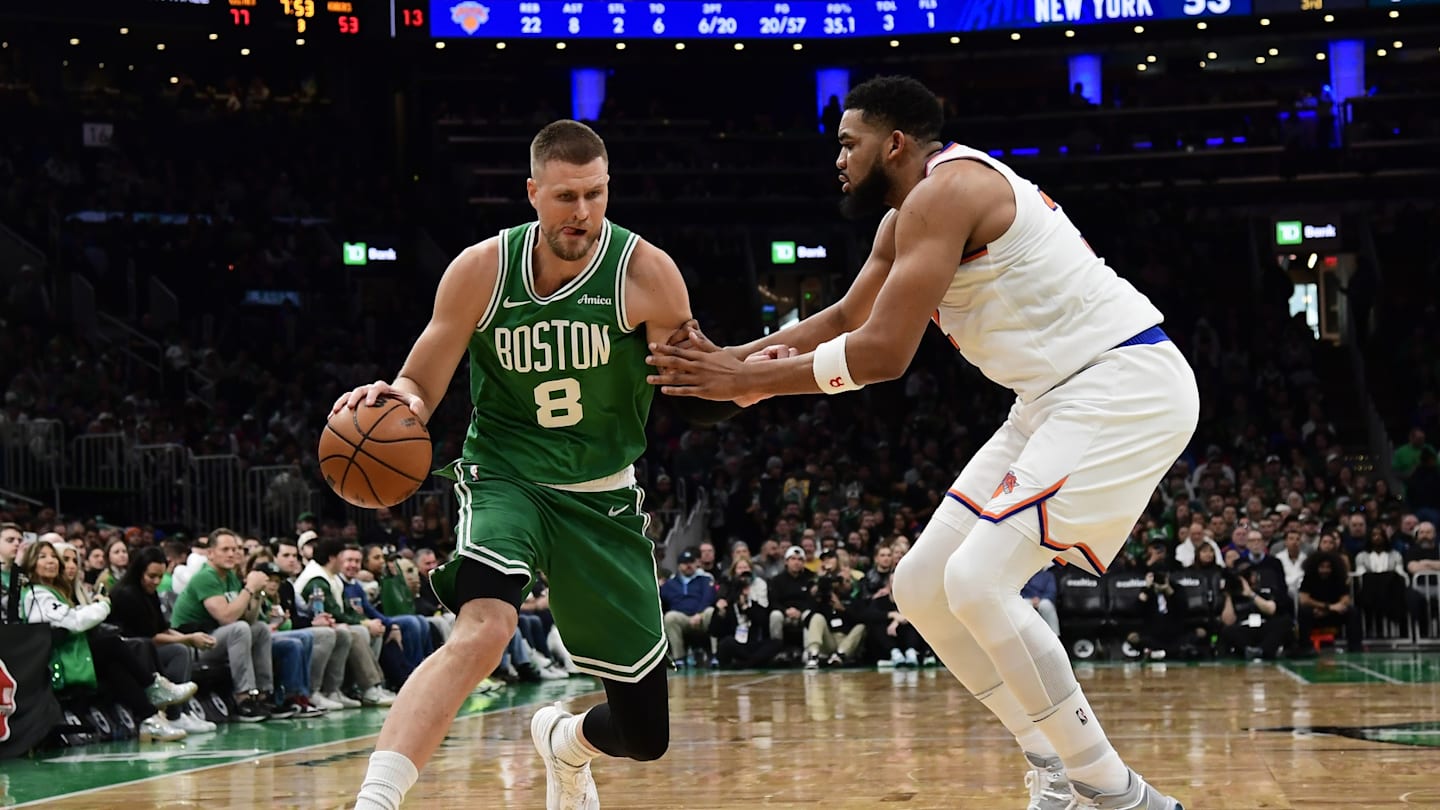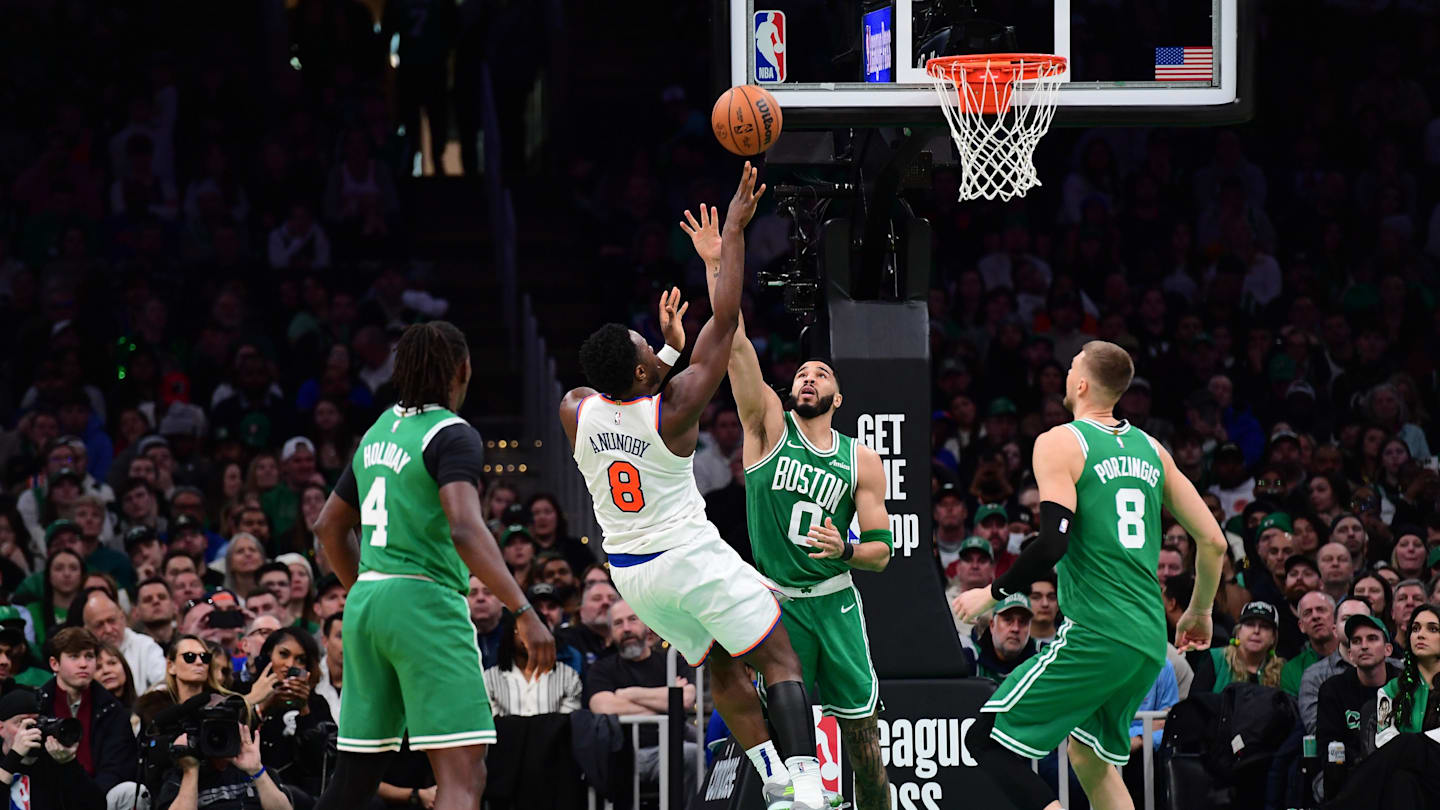NBA extension deadline: Top youngsters (and one key veteran) ink new deals

The 2024-25 NBA season begins Tuesday, but before the games begin, several teams signed notable players to contract extensions on the final day of the offseason.
Earlier this summer, four players drafted in the 2021 class — Detroit Pistons guard Cade Cunningham, Cleveland Cavaliers forward Evan Mobley, Toronto Raptors forward Scottie Barnes and Orlando Magic big man Franz Wagner — signed extensions for maximum deals worth five years, $225 million.
With so few teams projected to have significant salary cap space next season amid new restrictions due to the collective bargaining agreement, Monday’s signings included other top young players locking in guaranteed money instead of waiting until free agency.
We also saw one key veteran sign a new extension on Monday with a team looking to return to the NBA Finals.
ESPN NBA Insider Kevin Pelton reacts to Monday’s key deals and what they mean for their teams ahead of the 2024-25 season.
Jump to a deal:
Rockets sign top duo
Murphy nets new Pelicans deal
Suggs agrees to Magic extension
Gordon deal secures Nuggets core

-
Agreed to a reported five-year, $185 million extension with center Alperen Sengun
-
Agreed to a reported three-year, $106 million extension with guard Jalen Green
Grade: Pass for Sengun deal, fail for Green deal (extensions graded on pass/fail scale)

If you had set the over/under total on Rockets rookie extensions at 0.5, I probably would have taken the under. Instead, Houston ended up agreeing to deals with both of the team’s 2021 first-round picks, who have developed into core starters on a rising young team.
The Sengun extension is particularly surprising because the Rockets could have utilized his small $16.3 million cap hold to potentially create space next summer before re-signing him as a restricted free agent, similar to how the Philadelphia 76ers waited on signing Tyrese Maxey in order to sign Paul George.
But the two sides compromised on a deal that pays Sengun a little more than 80% of the expected $224 million max for rookie extensions. That’s a win for the Rockets given Sengun was as productive as any 2021 draft pick last season, when he averaged 21.1 PPG, 9.3 RPG and 5.0 APG and finished third in voting for Most Improved Player.
The trade-off that surely made this contract palatable for Sengun was getting a player option on the fifth year, a luxury that typically has been reserved for rookie extensions for elite players.
As ESPN’s Bobby Marks noted, Luka Doncic and Trae Young were the last two players to get that option. If Sengun develops into a superstar, Houston might regret not pushing for a straight five-year deal, particularly given even Maxey didn’t manage to get a player option on his new deal.
However, securing Sengun at considerably less than the maximum could prove important as the Rockets manage a number of quality young players graduating from rookie contracts to more lucrative extensions.
Green is one such case, and he got a creative extension that might work better for him than for Houston. The negotiations with Green figured to be complicated by differing views on his value around the league. The No. 2 pick in the 2021 draft, Green hadn’t yet played up to the max level achieved by the other three players taken in the top four (Cunningham, Mobley, Barnes) — all of whom already agreed to extensions over the summer.
Green has shown flashes of the stardom expected when he was drafted, especially in last season’s final 18 games where he averaged 24.2 points, 6.6 rebounds and 4.3 assists with above-average efficiency after Sengun suffered a season-ending ankle injury.
Given the difficulty finding elite shooting guards and Green’s age (22), that kind of performance merited max or near-max compensation. However, much of the Rockets’ success in that span came against lottery-bound teams, and Green’s efficiency was buoyed by far better 3-point shooting (38%) than in the first three-quarters of the season (31%).
As ESPN’s Shams Charania reported, Green is the first player to sign a three-year rookie extension with a player option. Typically, player options in rookie extensions have been limited to elite superstars who can command them in the final season of a five-year max deal. This structure is very different, putting Green potentially in unrestricted free agency in the summer of 2027 at age 25.
Alternatively, Marks pointed out that a three-year extension with a player option gives both sides the flexibility of negotiating an extension in October 2026 ahead of Green’s option. But if Green develops as he and Houston hope, he’ll be negotiating from a much stronger position.
With Sengun’s extension taking the Rockets out of the running for significant 2025 cap space, I think I’d probably have favored waiting to re-sign Green in restricted free agency next summer. Green will have to develop quickly into a star to be worth much more than his salary in this extension, and if he does, Houston will wish this contract was longer.
Grade: Pass

After playing fewer than a thousand minutes as a rookie, Murphy has been one of the most consistent performers from the 2021 draft class, averaging 14.6 PPG over the past two seasons while shooting 39% on 3s and 61% on 2s.
Add Murphy’s size (6-foot-8) and ability to capably defend multiple positions and he’s exactly the kind of role player every good team needs. That gave him considerable leverage in extension negotiations despite the fact that he started just 23 of his 57 games last season.
Although Murphy was apparently still playing with New Orleans’ second unit during training camp before suffering a hamstring strain that will sideline him to begin the season, his ascension to the starting lineup is only a matter of time.
Murphy’s shooting helps open things up for the rest of the Pelicans’ offense. Last season, New Orleans’ net rating was 4.6 points better per 100 possessions with Murphy on the court, per NBA Advanced Stats. As the cap rises, this extension will pay Murphy like an average starter. Next season, he’ll make approximately 16% of the team’s salary cap. By 2028-29, the final year of the deal, that should decline slightly to 15% with Murphy in the middle of his prime at age 28. I’d consider this a fair deal for the Pelicans if Murphy merely continues to perform at the same level.
If he improves, it could be a bargain. There are still difficult decisions to come for the Pelicans. As Marks noted, adding in a starting salary of $25 million for Murphy (with maximum 8% annual raises) puts them about $31 million below the 2025-26 luxury-tax line with key starter Brandon Ingram headed for unrestricted free agency. That predicament helps explain why Ingram hasn’t been extended heading into the final season of his contract.
On the open market, Ingram would likely command far more than $30 million, leaving New Orleans with three options: pay the luxury tax for a year, trade him for a player who will earn less or make another money-saving move. The obvious alternative is trading guard CJ McCollum, who will make $30.7 million in the final season of his extension in 2025-26.
Whoever else the Pelicans might have to sacrifice, they aren’t as important to the team’s future as Murphy — including Ingram, who’s three years older and a trickier fit alongside Dejounte Murray and Zion Williamson. Getting Murphy extended was a necessary piece of business that prevents him from really breaking the bank with a breakout season.
Grade: Pass

Suggs picked a good time to enjoy a breakthrough campaign. Drafted No. 5 out of Gonzaga, Suggs averaged 11.8 PPG and 4.4 APG as a rookie but shot just 21% from 3-point range. Suggs saw his role diminish as a sophomore, averaging 23.5 MPG after playing 27.2 as a rookie.
Things clicked at both ends for Suggs in Year 3. He made the All-Defensive second team as perhaps the NBA’s preeminent on-ball defender, hounding ball handlers with enough size to hold up on switches and offering defensive playmaking. Among players 6-foot-5 or under with at least 1,000 minutes, Suggs was one of just four to record at least two steals per 100 possessions.
On offense, Suggs took an enormous step forward as a jump shooter. Having improved somewhat to 33% on 3s in his second season, Suggs saw his percentage skyrocket to 40% in 2023-24, allowing him to score efficiently and provide the Magic’s offense needed spacing in an off-ball role.
He hasn’t shown the same kind of progress at the foul line, where last season’s 76% accuracy was almost right on his career mark. However, my research hasn’t found that to be as important an indicator in the NBA as for college players.
The bigger factor in Suggs’ long-term value will be his development as a playmaker. According to lineup data from NBA Advanced Stats, Suggs spent nearly two-thirds of his minutes at shooting guard last season but figures to shift back to an on-ball role with the arrival of Kentavious Caldwell-Pope.
Even with the ability of forwards Paolo Banchero and Franz Wagner to initiate the offense, the Magic will surely ask more of Suggs, whose 2.7 assists per game last season was the lowest mark of his career.
Beyond that, Suggs’ league-average usage rate was also a career low. Orlando would undoubtedly love to see him ramp that up this season and eventually emerge as a third shot creator alongside Banchero and Wagner. Intriguingly, Suggs was actually better relative to league average on self-created shots (with a touch time of more than two seconds, according to NBA Advanced Stats) than those set up by teammates last season
As long as Suggs can be the 3-and-D role player he was last season, this extension is about fair. Minnesota’s Jaden McDaniels — another All-Defensive second team selection — signed a rookie extension for five years and $136 million a year ago. Based on the projected 10% jump in the salary cap, Suggs’ $150 million is an equivalent contract a year later.
If Suggs adds more shot creation, the Magic could get a bargain. Suggs is also protecting himself against a potential decline from 3-point range that could have left him hitting restricted free agency looking more like a defensive specialist.
Looking ahead, Orlando’s penchant for utilizing team options offers plenty of payroll flexibility for 2025-26. Remarkably, every Magic player on a full NBA contract (i.e. not a two-way) is now signed through next season. Orlando would edge into the luxury tax by keeping all of them but can easily manage the 2025-26 payroll without much pain.
The Magic’s cap sheet will get trickier in 2026-27, when Banchero will likely begin a max rookie extension of his own. Orlando will almost certainly have to shed some salary by then to avoid paying the tax, but it’s plausible the young Magic — whose average age weighted by minutes played was fourth youngest in the NBA — could develop by then into contenders capable of justifying a tax bill.
Grade: Pass

Monday was also the deadline for veteran extensions for players with multiple seasons left on their contract, which is why Gordon inked a new deal that will see him exercise a $22.8 million player option for 2025-26, then add three years for the reported total of $133 million beyond the upcoming season.
That player option is important for Denver because Gordon figured to command significantly more than $22.8 million as an unrestricted free agent next summer had he declined the option, as reflected by his average salary of approximately $37 million during the new extension. By putting that maximum 40% raise off until 2026-27, the Nuggets can mitigate their tax bill next season, when they’ll be subject to the repeater tax for the first time if they pay the luxury tax this season as projected.
Whatever the mechanism, retaining Gordon was crucial for Denver given his strong fit alongside Nikola Jokic in the Nuggets’ championship-winning frontcourt. Gordon’s defensive versatility and above-the-rim finishing helped elevate Denver when he arrived from the Orlando Magic at the 2021 trade deadline. That made Gordon a keeper while the Nuggets deemed starting guard Kentavious Caldwell-Pope expendable when they allowed him to leave in free agency over the offseason. Gordon’s age (29) also fits better with Denver’s core of Jokic (also 29) and Jamal Murray (27) than the 31-year-old Caldwell-Pope.
The Nuggets are taking some risk of overpaying Gordon on the back end of this extension, which pays him through age 33. Because he’s more reliant on athletic ability than skill, Gordon might find it difficult to extend his prime. The Nuggets should be focused on winning championships while Jokic is the NBA’s best player, and retaining Gordon helps maintain that window so long as Denver can find enough perimeter production to replace Caldwell-Pope.
The timing of Gordon’s extension is interesting because it came concurrently with the Rockets scrapping their potential 2025 cap space by agreeing to an extension that pays center Alperen Sengun far more than his cap hit as a restricted free agent. Gordon would have been a top target for Houston had he tested free agency, and it’s possible that Gordon’s new deal with Denver helped convince the Rockets to give up on their aspirations.
Related
NBA: Mark Cuban says he would have asked for more…
Feb 13, 2025; Dallas, Texas, USA; Mark Cuban laughs during the second half of the game between the Dallas Mavericks and Miami Heat at American Airlines
NBA Scout Reveals Why Celtics Can Easily Beats Knicks in…
The Boston Celtics are one of the teams who are expected to be a contender at the end of the season. They are the defending NBA champions, so they feel like the
Nikola Jokić gives peak Nikola Jokić interview with Scott Van…
Nikola Jokić is still rewriting the record books — and treating it like just another day at the office. In a 149-141 overtime win over the Phoenix Suns
Knicks’ Struggles vs. NBA’s Elite Explained
The New York Knicks are one of the best teams in the NBA, but as of late, they have been defined more by their struggles than their triumphs.The Knicks are 0-7











